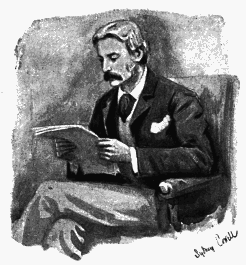
And then, under more favourable circumstances, I wrote 'Micah Clarke,' for patients had become more tractable, and I had married, and in every way I was a brighter man. A year's reading and five months' writing finished it, and I thought I had a tool in my hands that would cut a path for me. So I had, but the first thing that I cut with it was my finger. I sent it to a friend, whose opinion I deeply respected, in London, who read for one of the leading houses, but he had been bitten by the historical novel, and very naturally he distrusted it. From him it went to house after house, and house after house would have none of it. Blackwood found that the people did not talk so in the seventeenth century; Bentley that its principal defect was that there was a complete absence of interest; Cassells that experience had shown that an historical novel could never be a commercial success. I remember smoking over my dog-eared manuscript when it returned for a whiff of country air after one of its descents upon town, and wondering what I should do if some sporting, reckless kind of publisher were suddenly to stride in and make me a bid of forty shillings or so for the lot. And then suddenly I bethought me to send it to Messrs. Longmans, where it was fortunate enough to fall into the hands of Mr. Andrew Lang. From that day the way was smoothed to it, and, as things turned out, I was spared that keenest sting of ill-success, that those who had believed in your work should suffer pecuniarily for their belief. A door had been opened for me into the temple of the Muses, and it only remained that I should find something that was worthy of being borne through it.
'THE TRAIL OF THE SERPENT'
By M. E. Braddon
MY first novel! Far back in the distinctness of childish memories I see a little girl who has lately learnt to write, who has lately been given a beautiful brand-new mahogany desk, with a red velvet slope, and a glass ink-bottle, such a desk as might now be bought for three-and-sixpence, but which in the forties cost at least half a guinea. Very proud is the little girl, with the Kenwigs pigtails and the Kenwigs frills, of that mahogany desk, and its infinite capacities for literary labour, above all, gem of gems, its stick of variegated sealing-wax, brown, speckled with gold, and its little glass seal with an intaglio representing two doves—Pliny's doves, perhaps, famous in mosaic, only the little girl had never heard of Pliny, or his Laurentine Villa.
Armed with that desk and its supply of stationery, Mary Elizabeth Braddon—very fond of writing her name at full length, and her address also at full length, though the word 'Middlesex' offered difficulties—began that pilgrimage on the broad high road of fiction, which was destined to be a longish one. So much for the little girl of eight years old, in the third person, and now to become strictly autobiographical.
My first story was based on those fairy tales which first opened to me the world of imaginative literature. My first attempt in fiction, and in round-hand, on carefully pencilled double lines, was a story of two sisters, a good sister and a wicked, and I fear adhered more faithfully to the lines of the archetypal story than the writer's pen kept to the double fence which should have ensured neatness.
The interval between the ages of eight and twelve was a prolific period, fertile in unfinished MSS., among which I can now trace an historical novel on the Siege of Calais, an Eastern story, suggested by a passionate love of Miss Pardoe's Turkish tales, and Byron's 'Bride of Abydos,' which my mother, a devoted Byron worshipper, allowed me to read aloud to her—and doubtless murder in the reading—a story of the Hartz Mountains, with audacious flights in German diablerie; and lastly, very seriously undertaken, and very perseveringly worked upon, a domestic story, the outline of which was suggested by the same dear and sympathetic mother.
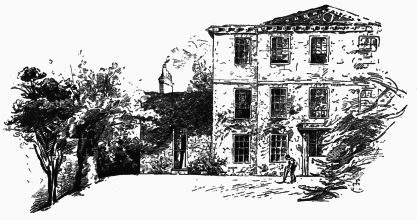
Now it is a curious fact, which may or may not be common to other story-spinners, that I have never been able to take kindly to a plot—or the suggestion of a plot—offered to me by anybody else. The moment a friend tells me that he or she is desirous of imparting a series of facts—strictly true—as if truth in fiction mattered one jot!—which in his or her opinion would make the ground plan of an admirable, startling, and altogether original three-volume novel, I know in advance that my imagination will never grapple with those startling circumstances—that my thoughts will begin to wander before my friend has got half through the remarkable chain of events, and that if the obliging purveyor of romantic incidents were to examine me at the end of the story, I should be spun ignominiously. For the most part, such subjects as have been proposed to me by friends have been hopelessly unfit for the circulating library; or, where not immoral, have been utterly dull; but it is, I believe, a fixed idea in the novel-reader's mind that any combination of events out of the beaten way of life will make an admirable subject for the novelist's art.
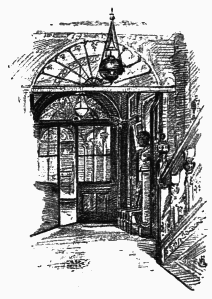
My dear mother, taking into consideration my tender years, and perhaps influenced in somewise by her own love of picking up odd bits of Sheraton or Chippendale furniture in the storehouses of the less ambitious second-hand dealers of those simpler days, offered me the following scenario for a domestic story. It was an incident which, I doubt not, she had often read at the tail of a newspaper column, and which certainly savours of the gigantic gooseberry, the sea-serpent, and the agricultural labourer who unexpectedly inherits half a million. It was eminently a Simple Story, and far more worthy of that title than Mrs. Inchbald's long and involved romance.
An honest couple, in humble circumstances, possess among their small household gear a good old easy chair, which has been the pride of a former generation, and is the choicest of their household gods. A comfortable cushioned chair, snug and restful, albeit the chintz covering, though clean and tidy, as virtuous people's furniture always is in fiction, is worn thin by long service, while the dear chair itself is no longer the chair it once was as to legs and framework.
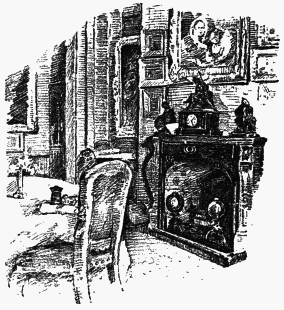
Evil days come upon the praiseworthy couple and their dependent brood, among whom I faintly remember the love interest of the story to have lain; and that direful day arrives when the average landlord of juvenile fiction, whose heart is of adamant and brain of brass, distrains for the rent. The rude broker swoops upon the humble dovecot; a cart or hand-barrow waits on the carefully hearth-stoned doorstep for the household gods; the family gather round the cherished chair, on which the rude broker has already laid his grimy fingers; they hang over the back and fondle the padded arms; and the old grandmother, with clasped hands, entreats that, if able to raise the money in a few days, they may be allowed to buy back that loved heirloom.
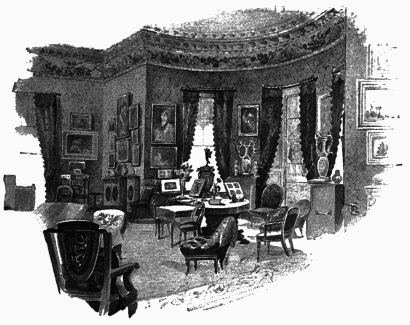
The broker laughs the plea to scorn; they might have their chair, and cheap enough, he had no doubt. The cover was darned and patched—as only the virtuous poor of fiction do darn and do patch—and he made no doubt the stuffing was nothing better than brown wool; and with that coarse taunt the coarser broker dug his clasp-knife into the cushion against which grandfatherly backs had leaned in happier days, and lo! an avalanche of banknotes fell out of the much-maligned horsehair, and the family was lifted from penury to wealth. Nothing more simple—or more natural. A prudent but eccentric ancestor had chosen this mode of putting by his savings, assured that, whenever discovered, the money would be useful to—somebody.